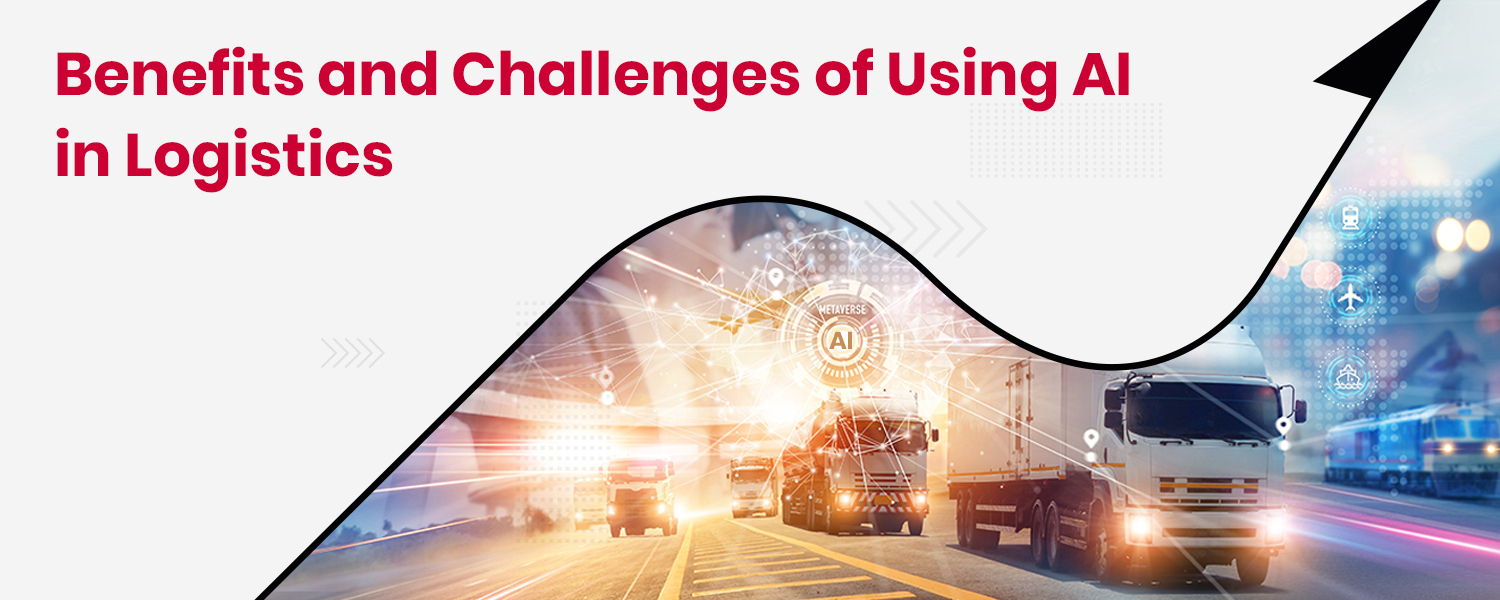We all know how complex the logistics landscape is. Throughout the supply chain, businesses face varied, complex operational issues despite all the tech innovations in recent years.
Artificial intelligence (AI) integration has guided a paradigm shift where all these complex issues are broken into seamless and intelligent operations. AI has given businesses the power to predict, adapt, and react, reshaping logistics and offering a glimpse into a future where businesses thrive on the cusp of innovation.
New-age AI tools are becoming mainstream in logistics, disrupting everyday operations from inventory management to route optimization for quick last-mile delivery. Yet, as AI charts new logistics territories, it brings a complex web of benefits and challenges, each demanding a closer look.
In this blog, we’ve highlighted these benefits and challenges and different use cases of AI in logistics that businesses can leverage.
What is AI in Logistics?
To the uninitiated, AI in logistics might evoke images of sci-fi automation and robotic prowess, but the reality is more practical and transformative.
In logistics, AI refers to the strategic infusion of intelligent algorithms that can learn, predict, and act to optimise the sprawling network that moves goods from point A to point B. AI in this context is not just one technology but a suite of them, each with specialised roles that collectively drive innovation and streamline logistics and supply chain management operations.
Machine Learning (ML), a subset of AI, acts as the predictive powerhouse within logistics. It churns through historical data and current trends to accurately forecast future needs. Natural Language Processing (NLP) brings human-like understanding to the mix. It interprets and responds to customer inquiries, processes verbal instructions in warehouses, and deciphers unstructured data that flows through emails and documents. A good example of this is NimbusPost, which uses machine learning to provide the widest courier delivery network across the world to businesses to expand their customer reach profoundly.
Together, these AI technologies revolutionise supply chain management and logistics automation. They bring about a world where predictive analytics help maintain lean inventories, dynamic routing saves fuel and time, and automated systems reduce the strain on human workers while boosting productivity.
Benefits of Integrating AI in Logistics
1. Data-Driven Decision Making
Gone are the days when logistics planning was a guesswork game. AI’s ability to process and analyze data sets translates into precision logistics planning. It sifts through volumes of data – from traffic patterns to weather reports – and interprets them to create a logistical plan that ensures the right goods are at the right place and time.
2. Operational Efficiency
The last leg of the delivery journey, the ‘last mile,’ has historically been fraught with inefficiencies. AI changes the game by ensuring that this final stretch is as streamlined as the preceding ones. It evaluates countless possible routes and selects the most time and fuel-efficient ones, exemplifying its capability in route planning and fleet management. Autonomous scheduling and real-time rerouting are but a glimpse into the revolutionary impact of AI in eCommerce logistics.
3. Cost Reduction
AI’s resource allocation optimisation ensures that every asset, whether it be a truck, warehouse space, or manpower, is utilised to its fullest potential. It mitigates the age-old problem of resource wastage by aligning logistics operations with the rhythmic ebb and flow of supply and demand. AI’s predictive maintenance models forecast equipment failures before they occur, ushering in a new era of operational reliability and cost savings.
4. Enhanced Customer Experience
AI-driven chatbots and customer service tools revolutionise how companies interact with their customers. They provide instantaneous, 24/7 support that caters to the modern consumer’s expectation of immediate and efficient service. This AI-backed personalisation is setting a new standard in customer care.
5. Predictive Capabilities
AI’s proficiency in analysing market trends and consumer behavior makes demand forecasting a precise science. It enables businesses to stock intelligently, replenishing their inventories according to the market demand.
By identifying potential pitfalls before they manifest, AI equips businesses with the foresight to navigate and adapt to the supply chain dynamics, ensuring that even in the face of adversity, the logistics operations operate smoothly toward their destinations.
Challenges Faced by Businesses when Choosing AI in Logistics
High Initial Investment
The foray into AI for logistics is not just a technological leap but also a financial one. Businesses must be prepared to invest heavily upfront in AI, including the purchase and setup of AI hardware and software and the integration with existing systems. This financial commitment can be daunting, especially for smaller enterprises or those with limited capital.
Data Security and Privacy
One of the most significant challenges when integrating AI in logistics is ensuring the security of sensitive data. AI systems require vast amounts of data to function effectively, raising concerns about protecting this information from breaches and unauthorized access.
Maintaining Human Oversight
Despite the efficiency of AI, there remains a need for human intuition and judgment in logistics. AI excels at processing data but may not always be adept at contextual decision-making. Ensuring that human oversight remains part of AI-assisted logistics is crucial for balancing automated efficiency and human insight.
Best Cases of AI in Logistics for Businesses
Driverless Delivery
The logistics landscape is morphing rapidly with the advent of autonomous vehicles, including self-driving trucks and drones. These technologies are streamlining delivery processes by enhancing speed, reducing the margin of human error, and ultimately reshaping the cost structure of logistics operations. Introducing driverless systems is not only about cutting-edge technology—it’s about reimagining the flow of goods in a safer, more efficient manner.
Warehouse Automation
The transformation from manual warehouses to AI-driven operations marks a pivotal turn in the logistics industry. The integration of AI in warehouse management facilitates real-time stock monitoring and predictive restocking, ensuring inventory optimisation that keeps pace with demand. Robotics play a crucial role in this evolution, taking on tasks from sorting to transporting goods within warehouses.
Smart Routing
Advanced routing algorithms leverage AI to determine the most efficient delivery paths, incorporating real-time adjustments in response to dynamic variables like traffic conditions. This conserves fuel, reduces emissions, and translates into substantial cost savings for businesses. By embracing AI for route optimisation, companies have improved their bottom line and contributed to a more sustainable environment.
Theft and Intrusion Detection
As logistics networks grow in scale and complexity, AI has become a sentinel for security, reinforcing surveillance capabilities and pre-empting theft or intrusion. By integrating with existing security systems, AI-driven solutions bolster the protective measures for warehouses and goods in transit, proactively identifying risks and enabling rapid response.
Streamlining Documentation
AI’s impact on documentation in logistics cannot be overstated. The shift from manual processing to AI-assisted systems has made Bill of Lading creation and tracking more efficient, reducing the administrative burden significantly. These AI-driven advancements are about speed, precision, and eliminating errors that can arise from human handling.
Customs Clearance and Compliance
AI is a vigilant overseer in international logistics, ensuring compliance with complex trade regulations. By automating customs clearance processes, AI significantly speeds up document handling, allowing businesses to clear goods more rapidly. Moreover, AI aids in risk mitigation by predicting and sidestepping potential legal and customs entanglements and safeguarding businesses against delays and fines.
Conclusion
Artificial intelligence is the word of the year. For eCommerce moguls and sprouting small businesses alike, AI stands as a beacon of innovation, driving efficiency and knitting together the loose ends of logistics with precision and foresight.
The challenges—the initial investments, the reshaping of workforce dynamics, or the vigilance required in data security—serve as reminders that the road to AI integration is paved with opportunities and obstacles. Do you know what your opportunity is? NimbusPost.
Everything we’ve discussed above: cost reduction, operational efficiency, customs clearance, warehouse automation, and data-driven decision-making, NimbusPost offers everything in a single platform to businesses of all sizes.
So, to the visionary entrepreneurs and the small business champions, let this be your clarion call. Embrace AI not as a mere tool but as a partner in growth and efficiency.
FAQs
How is Generative AI used in logistics?
Generative AI can be used in logistics in a variety of ways, including:
Demand forecasting
Generative AI can analyze historical data, market trends, and external factors to generate accurate demand forecasts.
Reverse logistics
Generative AI can analyze returns, repairs, and refurbishment data to assist in identifying optimal routes for returned products.
Route optimisation
Generative AI can generate optimised routes for fulfillment, including the last mile of delivery.
What is an example of AI in logistics?
Many eCommerce businesses combine real-time IoT sensor information with data streams from carriers, ports, airport operations, rail lines, traffic reports, and weather forecasts. This is a good example of artificial intelligence in logistics.
What is generative logistics?
Generative logistics is a logistics and supply chain management approach that utilises generative algorithms or models.



